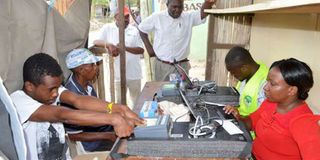Youth should vote to push their own agenda

Voter registration in progress at Kisauni area in Mombasa on February 17, 2016. PHOTO | KEVIN ODIT | NATION MEDIA GROUP
What you need to know:
- Mass voter registration targets close to nine million voters who have acquired new identity cards, most of them presumably young people who have come of voting age.
- The process of mobilising the youth to participate in politics, if it is to bring desirable results, must be isolated from the conventional politics that Kenyans are used to.
Once again, the significant role the youth is expected to play in the forthcoming elections has come into focus as the Independent Electoral and Boundaries Commission (IEBC) commenced a month-long countrywide mass voter registration. The exercise targets close to nine million voters who have acquired new identity cards, most of them presumably young people who have come of voting age.
And as politicians have always done in the past, they have come out to mobilise their youthful supporters to turn out to register and deliver the crucial votes they need for their victory in 2017. This pattern has been repeated every time the country takes any move that has a bearing on elections.
However, it has never been re-engineered in a manner that can anchor the youth agenda as other political processes unfold. This has been the case in all political parties in the country.
The fact that the political process is a capital-intensive initiative that can arguably be said to limit youth participation, especially in Kenya, makes young people’s large numbers their biggest asset.
However, it is clear that youth in this country have also failed to mobilise themselves independently and many lack interest in political processes that they consider of little value to their lives. This has left them vulnerable to politicians who lure them with generous manifestoes that are only reviewed when the next election beckons.
BETTER COMMUNICATION
The one-month voter registration, which is meant to get the process close to the masses, should be a wake-up call. Young people must rise up, register in large numbers, and start laying a foundation that they can use to participate in future political negotiations our polity has become famous for.
IEBC has failed to carry out sufficient voter registration sensitisation and it is not clear to many Kenyans what this one-month exercise is meant to achieve. Also, the dismally low number of new voters who have turned up to register points to a situation that needs better communication.
The process of mobilising the youth to participate in politics, if it is to bring desirable results, must be isolated from the conventional politics that Kenyans are used to. The youth constituent is dynamic, educated, and techno-savvy, which has lately emerged as a crucial tool that can be used to mobilise support effectively and at a low cost.
If Kenya’s politics is to significantly change from the current ethnicised pattern, it will be because the youth, who constitute about 60 per cent of the country’s population, have dictated it.
It will also give them an opportunity to boost their numbers in elective offices. Kenya’s young people have demonstrated great potential. The recent election of Football Kenya Federation’s youthful president, Mr Nick Mwendwa, signifies that young people’s choices are guided by conviction. Experience has shown that the older generation has little care for the needs and concerns of the youth.
President Uhuru Kenyatta has repeatedly urged Kenyans to support the youth. At the same time, he has endorsed a number of youth initiatives, but due to lack of ownership by the intended beneficiaries, they have failed to yield envisaged results.
YOUTH DEVELOPMENT INITIATIVES
For instance, since 2013, the Jubilee administration has launched three mega youth development initiatives — the Uwezo Fund, the 30 per cent preference for young people, and the revamped National Youth Service. The projects further advance the government’s quest to create opportunities for the youth while addressing the country’s unemployment problem. However, the results are not visible.
This has elicited cynical observations that the Jubilee administration, just like successive ones before it, has failed to create credible programmes that match the gravity of youth unemployment. While some among the top leadership may have goodwill to see the youth benefit from these initiatives, there are those who lack conviction to ensure that young people are involved in different spheres of the development of the country.
The journey to inclusion may not be won immediately but it must start somewhere. Young people must lay a strong foundation to dismantle saboteurs of youth involvement and development in the country by placing themselves in decision-making positions. Forming a political party by and for the youth may not be a far-fetched idea and could offer a future path.
Mr Obonyo is the author of Conversations about the Youth in Kenya. [email protected]





